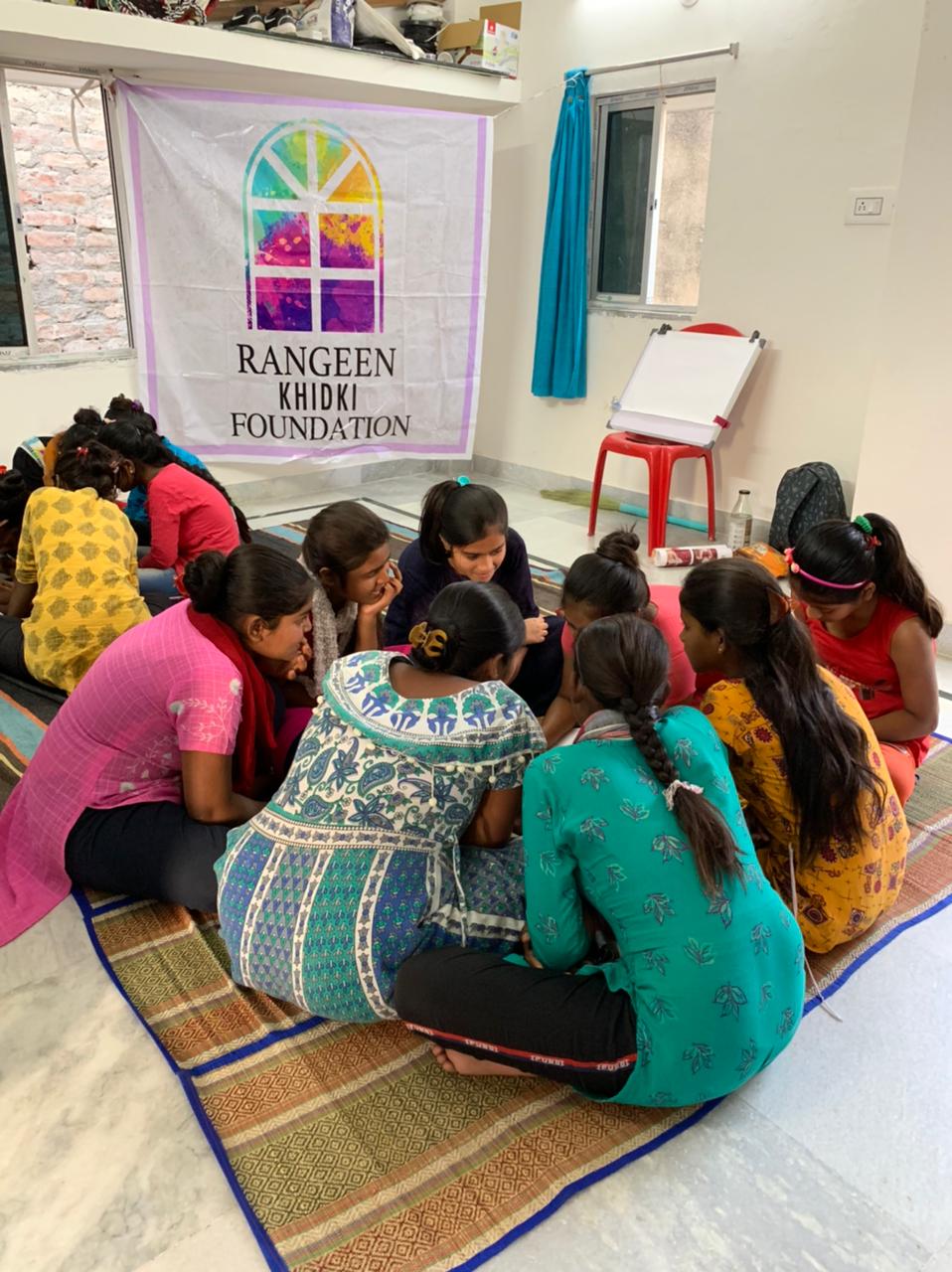Whenever the volunteers at Rangeen Khidki Foundation (RKF) begin with their capacity building workshops in the slums and outskirts of Kolkata, questions about the female reproductive system are mostly met with giggles and blank stares. Sometimes there are aghast expressions and embarrassed smiles.
But by the end of a two-and-a-half hour session, girls can be seen animatedly discussing the age at which they began menstruating and how many days their periods last for. When volunteers ask about the female anatomy, confident voices scream out the words ‘vagina’ and ‘fallopian tubes’ and ‘ovaries’.
“Those few hours are a journey and that journey is our greatest impact,” Sanjina Gupta, the founder of RKF, told LiveWire.

Young girls from a Kolkata slum participating in an activity organised during a Rangeen Khidki Foundation workshop. Photo: Rangeen Khidki Foundation
RKF is a non-profit organisation advocating for sexual rights and reproductive health. It was founded in February 2020, just before the pandemic brought everything to a standstill. “All our plans were shelved,” said Gupta.
But despite that, RKF has done admirable work in several areas in and around Bengal’s capital city. Ananya Chatterjee, who began working with RKF as a research intern, is now on her way to become a menstrual educator and facilitator. Most of RKF’s volunteers are young students who are interested in breaking period taboos and ensuring that vulnerable communities have access to resources regarding menstruation. In fact, one of their newest volunteers is a young girl from the slums of South 24 Parganas district. She is now the Period Leader of her community.
A year ago, there’d be barely any conversations about periods and its associated taboos in the slums around Panchanantala, one of Kolkata’s busiest and poshest neighbourhoods. But recently, RKF volunteers organised a session at a temple located at the very heart of the slum. The big, open space of the temple is a favourite gathering spot for the slum dwellers, and the women and girls of the slum took it upon themselves to hang posters of female reproductive organs on the walls of the temple on the day of the workshop.
“Men, women, children, grandparents – everyone was an enthusiastic participant at this workshop,” Chatterjee told LiveWire.
Also read: #BloodSafai: A 19-Year-Old’s Digital Campaign On Menstrual Waste
They then distributed sustainable cloth pads among themselves, and yes, they were inside the mandir premises for this too. In a society where even women belonging to educated families are still prohibited from entering temples and performing rituals, this is no mean feat. When I heard this wonderful story, I immediately wanted to narrate it to my many relatives who think a menstruating woman is ‘impure’.
“We never go to the slums and tell everyone on their faces that everything they believe in is a myth or superstition. Our aim is to empower the children to be curious. If their mother tells them that they won’t be allowed inside the kitchen when they’re menstruating, they should be able to ask why. We can’t undo age-old traditions with a couple of workshops, but we can teach them to seek answers,” Gupta explained.
Menstrual taboos are usually passed down from one generation to the other through hushed conversations between mothers and children. It becomes difficult to challenge these superstitions if one is not equipped with the correct vocabulary to talk about them. This is where RKF’s Menstrual Hygiene Management awareness modules help. There are separate modules tailored for boys, girls, women, men, and sex workers.
Change doesn’t happen in a day. But the small victories are a reminder that hope must not be lost. When Gupta was conducting a menstruation workshop for teachers as part of a collaboration with a different organisation, a woman came up to her and said that her family had told her not to water plants while she is menstruating because that would kill them.
Two months after the workshop, Gupta met that woman again. This time she told Gupta that she had gone against her family’s rules and watered the plants despite being on her period. The plants survived, anyway.
Sanjukta Bose is currently pursuing a Masters degree in English, and, yet, is terrible at writing bios.
Featured image: Rangeen Khidki Foundation conducting a menstrual health awareness workshop in Kolkata. Photo: Rangeen Khidki Foundation

